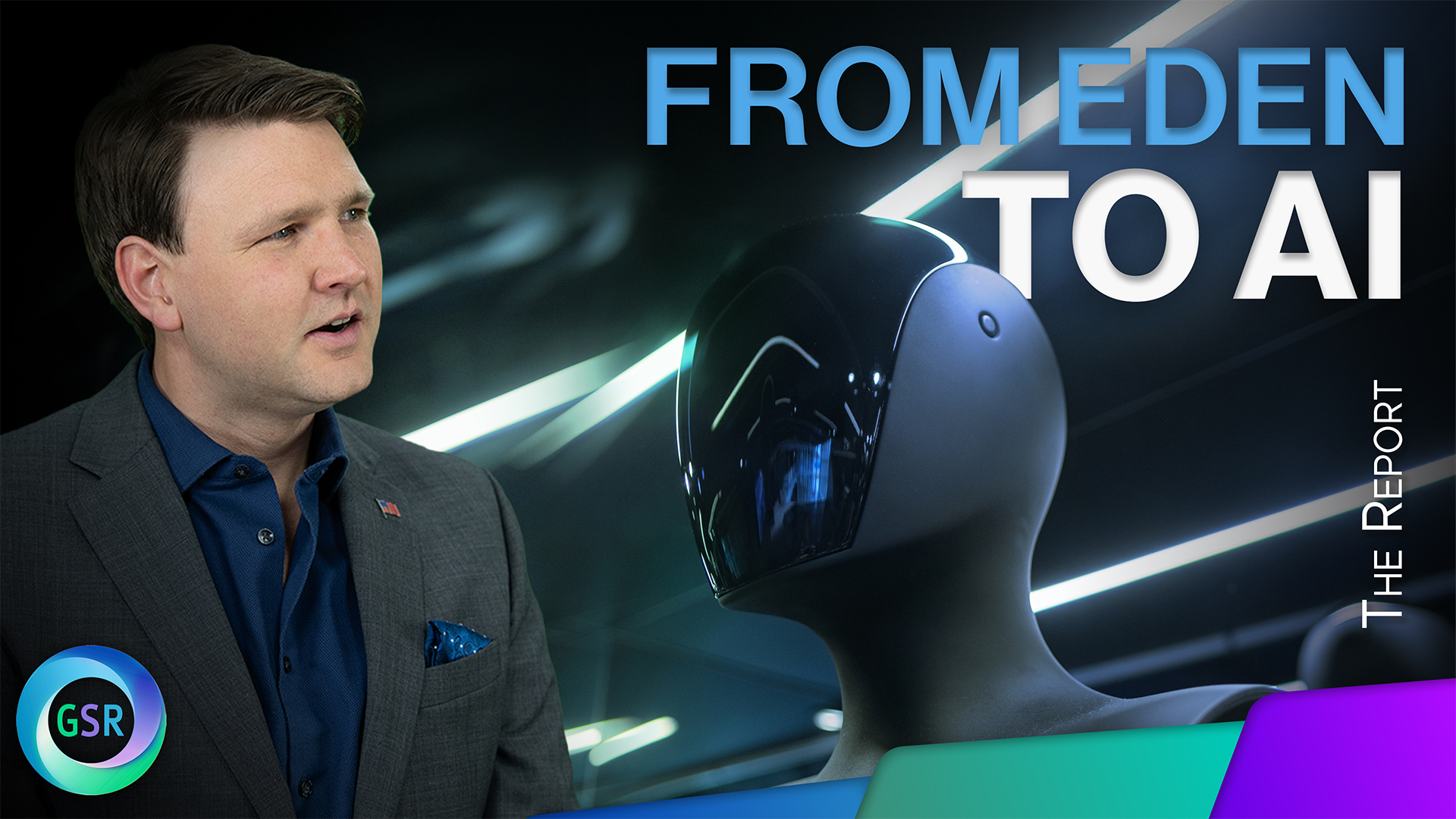We’ve explored the idea that while AI is revolutionary, it remains a product of human design, devoid of organic intelligence or morality. Today, we discuss the topic of transhumanism, and the dangers of this AI cult.
Artificial Intelligence has potentials for both good and evil. But its potential for harm stems from its reliance on algorithms and logic, often neglecting moral and ethical considerations. And certainly, since AI is not created in the image of God, it can’t have a true conscience or sense of morality. This leads us to the question: Where does that leave humanity in our relationship with this powerful technology?
Russell Brand, a notable podcaster and recent confessor of the Christian faith, articulated this sentiment in a social media post, stating: “When they say ‘Science,’ they mean ‘Scientism.’ In other words, a new way of god.” Brand’s words reflect a deeper concern that many creators of AI lack faith in any higher power beyond the constructs they are attempting to create.
Where is this godless scientism leading? Perhaps to humanity’s suicide? I know that sounds a little extreme, but there seem to be enough science fiction movies to go around that show the perils of worshiping technology and forgetting our moral compass. But this isn’t science fiction.
For example, Elon Musk recounted having a conversation with Larry Page, the founder of Google. During their talk Musk asserted that we needed to favor humans over AI. Sounds like a pretty straightforward idea, right? Regarding the development of AI, Musk said, “We need to make sure humanity is okay.” But instead, Larry Page said Musk was discriminating against machines! “He called me a speciesist,” says Musk. So, Larry Page, one of the most powerful people on earth, questioned the idea of viewing humanity as something to safeguard. And this tees up the war going on within the Artificial Intelligence community. Some believe, like Musk, we must slow down with the way we approach AI. But those like Bill Gates and Larry Page say it should be “full steam ahead!”.
The problem is that we don’t know the consequences–we are truly in uncharted territory. Some scholars have even begun to propose that the Antichrist will eventually use AI to do signs and wonders. This leads us to the concept of transhumanism.
Many of these technologists, who believe in something called “transhumanism” believe in a melding of humanity with technology. They seem to think that it will lead to eternal life. The Oxford dictionary defines transhumanism like this: “The belief or theory that the human race can evolve beyond its current physical and mental limitations, especially by means of science and technology.”
Whichever definition you want to go with, these tech titans and self-proclaimed innovators, and CEOs of companies like Google, Neuralink (which is Elon Musk’s invention), and Biohack.me are part of a movement that envisions a Transhumanist utopia.
And this leads to things like the wild but true story of biohacker Bryan Johnson getting blood transfusions from his own son! Bryan Johnson says this, “I will never die!” As you can imagine, if you dig down that rabbit hole, Johnson may be mental, but people like Johnson believe that through AI and the fusion of technology with our human souls, we can transcend our biological limitations and reach toward the divine.
Zoltan Istvan, a prominent advocate of the Transhumanist political party (Yes, there really is a transhumanist political party) wrote in his article Why I Advocate for Becoming a Machine: Biology is simply not the best system out there for our species’ evolution. It’s frail, terminal, and needs to be upgraded. In fact, even machines may be upgraded in the future too, and rendered as junk as our intelligences figure out ways to become beings of pure organized energy.
While humanity is undeniably intelligent—celebrating our greatest athletes, brilliant engineers, and those who conquer the extremes—this aspiration to evolve into immortal machines creates a modern-day Tower of Babel. And notice that they relate this entire field to evolution.
This endeavor raises critical questions about morality, ethics, and the imperative to be guided not by what we can achieve, but by what we should achieve. The potential for self-destruction, much like the fate of the Tower of Babel, looms large.
Most would agree that technologies that provide biotech limbs for amputees or organs for those in need of a transplant are beneficial. When AI is applied thoughtfully and ethically, it has the power to improve countless lives. However, we must remain vigilant and not be deceived by the allure of technological omnipotence.
AI is not God, and we have to resist the age-old temptation of believing we can become like gods ourselves. This is, after all, what the serpent offered to Adam and Eve in the Garden, is it not?
So, when it comes to AI, we should keep a balanced approach that prioritizes ethical considerations and human values over unbridled ambition. This is essential to ensuring that our technological advancements serve to uplift humanity rather than lead to its downfall. We will, after all, give an account to the Supreme Creator about how we use the time that we have on Earth.
I’m David Rives,
Truly, the heavens declare the glory of God.
The form is not published.

